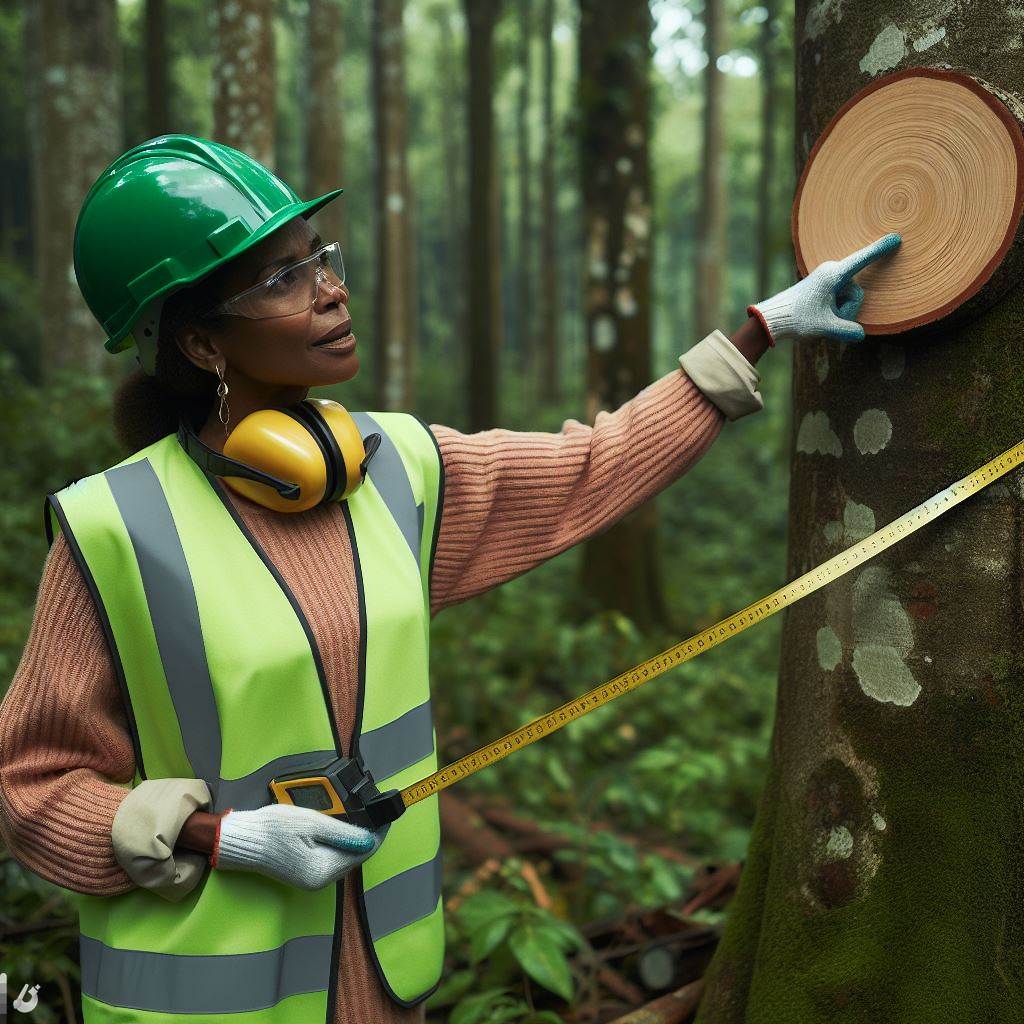Introduction
In the heart of Canada’s thriving forestry sector lies a crucial balance, where nature’s resources meet the dedicated stewardship of Canadian foresters.
Forests in Canada aren’t merely landscapes; they are ecosystems teeming with life, sources of resources, and pillars of environmental health.
Foresters play an indispensable role in the intricate dance of managing and conserving these vast woodlands.
Their work goes beyond the daily tasks; it’s a commitment to sustainability, ensuring that future generations inherit flourishing forests.
In “A Day in the Life of a Canadian Forester,” we step into the boots of these custodians of the woods.
The blog will unravel the unique challenges, responsibilities, and moments of triumph that constitute a typical day for a Canadian forester.
From sustainable harvesting practices to wildlife conservation efforts, each day brings a new set of tasks and a deep sense of responsibility.
Embark on this immersive journey to gain insights into the rhythm of a Canadian forester’s daily life.
Explore the nuanced decisions, the appreciation for nature’s intricacies, and the dedication that underpins their crucial role in managing and preserving the vibrant forests that define Canada’s landscape.
Educational Background and Skills
To become a Canadian forester, you need a Bachelor’s degree in forestry or a related field.
Additional certifications or specialized training can greatly enhance career prospects.
Some of these certifications may include forest management, wildlife conservation, or environmental assessment.
Key skills and attributes necessary for success as a forester (e.g., strong problem-solving skills, physical stamina, knowledge of forestry practices)
Key skills necessary for success as a forester include strong problem-solving abilities.
You must also have physical stamina to work in challenging outdoor environments.
A comprehensive knowledge of forestry practices and principles is crucial.
Communication skills are essential for interacting with colleagues, stakeholders, and the public.
Foresters must possess excellent analytical skills to assess and interpret complex data.
They should have a keen attention to detail to ensure accurate data collection and analysis.
Teamwork and collaboration skills are important for working effectively with other professionals.
Leadership skills can be valuable for those aspiring to advance their careers in forestry.
Adaptability and flexibility are necessary to handle the ever-changing demands of the profession.
Foresters should have a passion for the environment and a strong commitment to sustainability.
Being able to think critically and make sound decisions is crucial in forestry management.
Proficiency in using modern technology and software is becoming increasingly important in the field.
Having a good understanding of legislation and regulations related to forestry operations is vital.
Unlock Your Career Potential
Visualize a clear path to success with our tailored Career Consulting service. Personalized insights in just 1-3 days.
Get StartedKnowledge of safety protocols and practices is essential to ensure a secure working environment.
While not mandatory, obtaining membership in a professional forestry association is beneficial.
Continuing education and keeping up with industry advancements is important for career growth.
Therefore, becoming a Canadian forester requires a Bachelor’s degree in forestry or a related field.
Additional certifications, specialized training, and a diverse skillset can greatly enhance career prospects.
Strong problem-solving skills, physical stamina, and a comprehensive knowledge of forestry practices are necessary for success in this profession.
Moreover, effective communication, analytical abilities, attention to detail, and teamwork are crucial attributes.
Leadership skills, adaptability, passion for the environment, and a commitment to sustainability are also beneficial.
Proficiency in technology, understanding legislation, and prioritizing safety are all important factors.
Continued education and staying updated with industry advancements contribute to career growth in forestry.
Read: Env. Engineering: Ethics and Responsibilities
Job Responsibilities
Providing an overview of the primary responsibilities that Canadian foresters have
- Canadian foresters are responsible for managing and protecting the country’s vast forest resources.
- They ensure sustainable forest management practices that balance economic, social, and environmental needs.
- Foresters play a crucial role in preserving forest habitats, biodiversity, and natural ecosystem functions.
- They monitor and assess forest conditions, including tree health, growth rates, and potential risks such as pests or diseases.
- Canadian foresters also collaborate with other stakeholders like government agencies, Indigenous communities, and industry partners to develop forest management plans.
- They work towards achieving long-term forest sustainability goals while considering the diverse needs of different users.
How foresters contribute to sustainable forest management
- Planning and implementing harvesting operations: Foresters design and supervise logging activities to ensure minimal environmental impact and sustainable timber production.
- Reforestation efforts: They develop and oversee reforestation programs to restore harvested areas, ensuring the replenishment of tree cover and forest biodiversity.
- Regulating logging activities: Canadian foresters enforce regulations and policies related to logging practices, ensuring compliance with sustainable forestry standards.
- Monitoring and mitigating environmental impacts: They assess the potential ecological effects of logging operations and recommend measures to minimize harm to water quality, wildlife, and sensitive ecosystems.
- Sustainable forest certification: Foresters play a key role in assisting forest companies to achieve certification standards like Forest Stewardship Council (FSC) or Sustainable Forestry Initiative (SFI), highlighting responsible forest management practices.
The role of foresters in analyzing forest health and conducting environmental assessments
- Forest health analysis: Foresters assess the overall health and vitality of forest ecosystems, including identifying and managing pest outbreaks and disease control measures.
- Environmental assessments: They conduct environmental impact assessments for proposed forestry projects to evaluate potential effects on air and water quality, soil, and wildlife habitats.
- Providing recommendations for ecosystem management: Based on their assessments, foresters advise on the preservation and restoration of ecosystem integrity and biodiversity, suggesting strategies for sustainable land use and conservation.
- Research and data collection: Canadian foresters engage in scientific research and collect data on forest ecosystems to improve understanding and inform management decisions.
In fact, Canadian foresters are responsible for managing and protecting forests while ensuring sustainable practices.
Their primary responsibilities include planning and implementing harvesting operations, undertaking reforestation efforts, monitoring forest health, conducting environmental assessments, and providing recommendations for ecosystem management.
Through their expertise, foresters contribute to the preservation, balanced use, and long-term sustainability of Canada’s valuable forest resources.
Read: Canadian Env. Engineers in Global Projects

A Typical Day
Being a Canadian forester is a rewarding and fulfilling profession that involves a diverse range of tasks and responsibilities.
A typical day in the life of a Canadian forester is anything but predictable, as they constantly work in different environments and collaborate with various professionals and stakeholders.
Fieldwork: Exploring Nature’s Wonders
- Early mornings often start with a cup of coffee as a forester prepares for the day’s fieldwork.
- Exploring vast forested areas is a key part of a forester’s role, allowing them to study and assess different species and their habitats.
- They closely examine the health and growth of tree populations, identifying any signs of disease or invasive species.
- Collecting data on climate, soil quality, and tree density helps the forester make informed decisions regarding forest management strategies.
- Detailed observations and measurements lay the foundation for accurate data analysis and further insights.
Data Collection: Piecing Together the Puzzle
- Data collection is a crucial aspect of a forester’s day, requiring careful attention to detail.
- Using specialized tools, they measure tree diameter, height, and age, contributing to the inventory of forests.
- They also assess the biodiversity of flora and fauna, evaluating the impact of human activities on the ecosystem.
- Collecting samples of soil, water, and air helps in monitoring environmental parameters and identifying potential pollutants.
- By gathering these essential data points, foresters develop a comprehensive understanding of the forest ecosystem.
Data Analysis: Discovering Hidden Patterns
- Back in the office, foresters spend time analyzing the data they have collected rigorously.
- They use statistical software and geographic information systems (GIS) to organize and interpret the data.
- By identifying patterns and trends, they can assess the forest’s health and create sustainable management plans.
- They collaborate with other professionals, such as biologists and ecologists, to gain diverse perspectives and expertise.
Collaboration: Working Together for a Greener Future
- Foresters regularly interact and collaborate with landowners, providing guidance on sustainable forest management practices.
- They communicate with government officials and industry stakeholders to ensure adherence to environmental regulations.
- Participating in meetings and public consultations, they contribute to the development of forest policies and conservation strategies.
- Collaboration with biologists and other researchers fosters a holistic approach to forest management, considering both ecological and economic factors.
- Together, these professionals strive to preserve and protect Canada’s vast forests for future generations.
A day in the life of a Canadian forester is filled with excitement, challenges, and the opportunity to make a positive impact on the environment.
Whether they’re venturing into the wilderness or analyzing data in the office, these dedicated individuals play a crucial role in sustainable forest management and conservation.
Read: Agricultural Education in Canada Today
Challenges and Rewards
In the challenging profession of Canadian forestry, foresters are faced with a multitude of obstacles on a daily basis.
Navigating ever-changing forestry regulations is one such hurdle that requires constant adaptation and vigilance.
Additionally, addressing the impacts of climate change on forests poses a significant challenge for these dedicated professionals.
With this in mind, it is important to highlight the rewards and benefits that come with being a Canadian forester.
Job satisfaction is one of the most prominent rewards, as these individuals have the privilege of working in a field that aligns with their passion for the environment.
The ability to spend ample time outdoors is another great advantage, offering a welcome break from the confines of an office.
Moreover, being a forester means playing an active role in environmental sustainability and contributing to the preservation of forests for future generations.
The challenges that Canadian foresters commonly face in their profession (e.g., navigating changing forestry regulations, addressing climate change impacts)
One of the main challenges that Canadian foresters commonly face is the ever-evolving landscape of forestry regulations.
With the aim of ensuring sustainable practices, regulations are subject to frequent updates and amendments.
Navigating these changes requires constant education and staying up to date with current laws and policies.
As climate change becomes an increasingly pressing issue, foresters are on the frontlines when it comes to addressing its impacts.
Rising temperatures, droughts, and wildfires all have significant implications for the health and longevity of forests.
Foresters must develop strategies to mitigate the effects of climate change, such as implementing adaptive forest management techniques and promoting the use of sustainable forestry practices.
The rewards and benefits of being a forester, such as job satisfaction, opportunities for outdoor work, and contributing to environmental sustainability
Despite these challenges, the rewards of being a forester are abundant.
Job satisfaction is perhaps the most fulfilling aspect, as foresters have the opportunity to make a tangible difference in the world by protecting and conserving forests.
The ability to work outdoors also offers a wealth of benefits, allowing these individuals to connect with nature and witness its beauty firsthand.
Furthermore, being a forester means having the chance to contribute to environmental sustainability.
By implementing sustainable forestry practices, these professionals help ensure the long-term health and resilience of forests, creating a positive impact on ecosystems and wildlife.
Through their work, foresters actively participate in the preservation of natural resources for future generations to enjoy.
In short, the life of a Canadian forester is both challenging and rewarding.
Navigating changing forestry regulations and addressing the impacts of climate change are obstacles that require constant adaptation.
However, the rewards of job satisfaction, opportunities for outdoor work, and contributing to environmental sustainability make this profession incredibly fulfilling.
Canadian foresters play a vital role in protecting and preserving forests, ensuring their beauty and resources are available for generations to come.
Read: The Role of Technology in Canadian Farms
Conclusion
Canadian foresters play a crucial role in sustainable forest management.
Their dedication to preserving and protecting our natural resources ensures the long-term health and vitality of our forests.
Through this glimpse into their daily lives, we have gained valuable insights into the challenges they face and the importance of their work.
Understanding a day in the life of a Canadian forester has enlightened us about the immense responsibility they carry.
We have learned about their expertise in monitoring and assessing forest health, implementing sustainable harvesting practices, and safeguarding biodiversity.
This firsthand experience has deepened our appreciation for the critical role played by Canadian foresters in maintaining the delicate balance between human needs and environmental conservation.
Their commitment to sustainable forest management is vital in mitigating climate change, protecting wildlife habitats, and ensuring a sustainable supply of timber and other forest products.
For those inspired by this glimpse into the life of a Canadian forester, pursuing a career in forestry offers a rewarding and impactful path.
It offers the opportunity to make a difference in promoting sustainability and conserving our natural resources.
Further exploration can be done through resources such as educational programs, professional associations, and networking with experts in the field.
Canadian foresters are unsung heroes, working tirelessly to protect and sustain our forests.
Their dedication and expertise are critical in ensuring a healthy environment for future generations.
Let us all appreciate their invaluable contributions and consider forestry as a potential career path.
Together, we can create a greener and more sustainable future.




